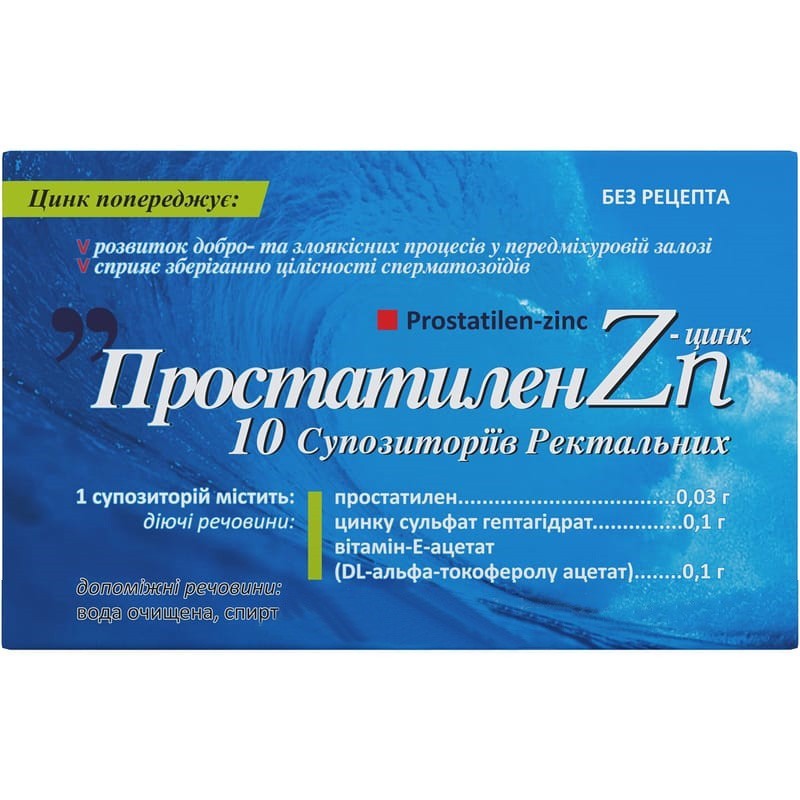



 Secure and encrypted payment processing
Secure and encrypted payment processing We ship to over 40 countries including the USA, UK, Europe, Australia and Japan
We ship to over 40 countries including the USA, UK, Europe, Australia and Japan Guaranteed refund or reship if you haven't received your order
Guaranteed refund or reship if you haven't received your orderProstatilen-zinc is a combination drug used to treat diseases of the prostate gland. prostatilene, which is part of suppositories, has an organotropic effect on the prostate gland (prostatoprotective effect), anti-inflammatory effect, reducing edema and leukocyte infiltration of the gland, improves microcirculation and platelet hemostasis, positively affects the functional activity of spermatozoa. prostatilene also stimulates the activity of the humoral immunity and some factors of the bodys resistance, affects the tone of the muscles of the bladder, including the detrusor tone.
Zinc prevents the development of benign and malignant processes in the prostate gland, helps to maintain the integrity of sperm, increases sexual desire, is a factor in immune defense, is necessary for the maturation of specific immune cells, the synthesis of cytokines, and body resistance. Zinc deficiency, which is characteristic, in particular, of elderly people, leads to impotence, regression of the male sex glands and testicles, and a decrease in sperm count.
Vitamin E supports the biological activity of sperm, has anticoagulant properties, prevents intravascular coagulation, as it has the ability to bind prothrombin, also has an anti-inflammatory and pronounced antioxidant effect, and prevents the development of atherosclerosis.
The components of the drug are effectively absorbed in the intestine. Vitamin E in the blood binds to lipoproteins and partially to albumin, is deposited in the adrenal glands, pituitary gland, testes, adipose and muscle tissues, and liver. It is excreted mainly with bile. Zinc does not accumulate, it is excreted in feces (85%), as well as in urine and sweat. There is no information on the pharmacokinetics of prostatylene. Rectal administration of the drug ensures the effective intake of active substances in the local bloodstream of the pelvic organs and male genital organs.
Treatment and prevention of chronic prostatitis, benign prostatic hyperplasia, complications after surgery on the prostate gland, as well as sexual disorders, male infertility.
Before use, it is necessary to tear one suppository in the primary packaging along the perforation line of the blister pack; then, holding the edges of the film, tear it in different directions and remove the suppository from the primary package.
For adults, enter the suppository deep into the anus.
For therapeutic purposes, apply 1 suppository 2 times a day (morning and evening) for 5-10 days.
For the purpose of prevention - 1 suppository 1 time per day.
The duration of treatment is determined by the doctor depending on the nature and severity of the disease, the achieved therapeutic effect, the nature of the therapy (monotherapy or complex treatment). If necessary, the course of treatment can be repeated after 1-6 months.
Hypersensitivity to the components of the drug, renal failure, myocardial infarction, cardiosclerosis. hypersensitivity to cattle proteins.
Allergic reactions, including pruritus, flushing of the skin, skin rashes, changes at the injection site, including burning. with prolonged use of vitamin E in high doses, a decrease in blood coagulability, bleeding from the gastrointestinal tract, liver enlargement, creatinuria, the appearance of a feeling of fatigue, weakness, headache, nausea, dizziness, blurred vision are possible.
With caution, the drug should be prescribed for atherosclerosis, an increased risk of thromboembolism.
When using the drug, it is necessary to observe the dosage and duration of the course of treatment prescribed by the doctor to prevent overdose and the occurrence of hypervitaminosis E.
With prolonged use of the drug in high doses, it is necessary to control the time of blood coagulation.
Use during pregnancy and lactation. The drug is not used in women.
Children. The drug is not prescribed for children.
The ability to influence the reaction rate when driving vehicles or working with other mechanisms. There are no data on the effect of the drug on the ability to drive vehicles or work with mechanisms. However, in some patients, the drug may cause dizziness and blurred vision, therefore, during therapy it is recommended to refrain from activities requiring an increased concentration of attention and speed of reaction (including driving vehicles and mechanisms).
It cannot be used simultaneously with iron and silver preparations, agents having an alkaline environment (sodium bicarbonate, trisamine), and indirect anticoagulants (dicumarol, ethyl biscum acetate).
Vitamin E enhances the effects of steroid drugs and NSAIDs (sodium diclofenac, ibuprofen, prednisone) reduces the toxic effects of cardiac glycosides (digitoxin, digoxin), vitamins A and D. The use of vitamin E in high doses can cause vitamin A deficiency in the body. Vitamin E and its metabolites have an antagonistic effect on vitamin K. Vitamin E increases the effectiveness of antiepileptic drugs in patients with epilepsy. Colestyramine, colestipol, mineral oils reduce the absorption of vitamin E.
No cases of overdose of suppositories with prostatylene have been reported. with an overdose of zinc sulfate, fever, impaired lung function, dehydration, imbalance of electrolytes in blood plasma, renal failure are noted.
When taking the drug in high doses (400 mg / day for a long time), dyspeptic disorders, a feeling of fatigue, general weakness, headache, creatinuria, an increase in the activity of creatine kinase, an increase in the concentration of cholesterol, triglycerides, a decrease in the concentration of thyroxine and triiodothyronine in the blood plasma are possible, increased urinary estrogen and androgen levels. There is no specific antidote. The treatment is symptomatic.
At a temperature not exceeding 25 ° C.